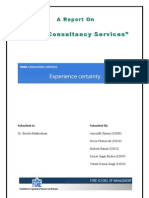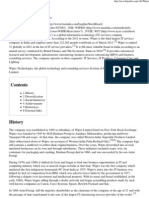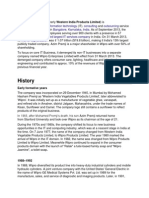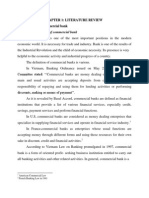TCS - Corporate Strategy
TCS - Corporate Strategy
Uploaded by
Bharath RamaiahCopyright:
Available Formats
TCS - Corporate Strategy
TCS - Corporate Strategy
Uploaded by
Bharath RamaiahCopyright
Available Formats
Share this document
Did you find this document useful?
Is this content inappropriate?
Copyright:
Available Formats
TCS - Corporate Strategy
TCS - Corporate Strategy
Uploaded by
Bharath RamaiahCopyright:
Available Formats
TCS Governance
Board Of Directors
Non-Executive Board Members
Cyrus Mistry, Chairman S Ramadorai, Vice Chairman Prof. Clayton M Christensen, Director Aman Mehta, Director Dr. Ron Sommer, Director Executive Board Member
Venkatraman Thyagarajan, Director Dr. Vijay Kelkar, Director Ishaat Hussain, Director Phiroz A Vandrevala, Director OP Bhatt, Director
N Chandrasekaran, Chief Executive Officer and Managing Director
TCS - Corporate Strategy
Growth has been the key theme of TCS' journey so far. Learn more below about TCS and the strategy it is pursuing for continued longer-term growth.
Corporate Overview
Tata Consultancy Services Limited (TCS) is an IT services, business solutions and outsourcing organization that delivers real results to global businesses, ensuring an unmatched level of certainty. TCS offers a consulting-led, integrated portfolio of IT and IT-enabled services delivered through its unique Global Network Delivery Model (GNDM). Learn more about TCS in the Corporate Facts section.
The Growth Opportunity
TCS operates in a large, growing global market for IT and IT-enabled services. Globally, organizations are spending more on IT as new technologies emerge, offering unique opportunities to gain a competitive advantage. Moreover, industries and geographies that lagged behind others in leveraging technology are now catching up. Further, the proportion of IT services budgets that is spent on external providers is going up as the shelf-life of technologies is reducing and corporations are looking for greater efficiency and variability in their costs. With a minuscule market share in this growing market, there is much headroom for TCS longer-term growth.
Strategy For Longer-Term Growth
TCS strategy for longer-term growth is to continually extend the core IT services
business by expanding its geographic reach, industry coverage and service capabilities and deepening existing client relationships, building or acquiring emerging businesses and adopting or creating new business models and business solutions through continuous innovation. Key elements of this strategy are summarized here:
Customer-centricity Full Services Capability Global Network Delivery Model (GNDM) Strategic Acquisitions Non-linear Business Models
Customer-centricity: We seek to build, nurture and deepen customer relationships so we are trusted strategic partners to our customers. Our industry-segmented, customer-centric organization is an important enabler that has ensured high levels of accountability, superior customer service and intimacy. Full Services Capability: TCS has been investing in building a comprehensive, integrated portfolio of services to capture the entire value chain of IT, presenting a compelling value proposition for global enterprises making us a one-stop shop for many key clients, significantly deepening the relationship and boosting our share of the wallet. Global Network Delivery Model (GNDM): TCS' GNDM lets us seamlessly and uniformly deliver services to global customers from multiple locations across India, China, Europe, North America and Latin America. Teams separated by time zones collaborate on projects, leveraging all of TCS' assets while subscribing to one global service standard. It uses multiple levers of time zone, language, skills and local business knowledge to deliver high quality business solutions seamlessly across the globe, using a globally connected workforce, integrated delivery processes and multi-tiered infrastructure. This model developed by TCS is now recognized as the benchmark of excellence in software development. For large clients expanding beyond their home markets, the scale and depth of our GNDM capability makes us their preferred strategic partner. Strategic Acquisitions: While primarily focusing on organic growth, TCS is also open to selective strategic acquisitions in order to penetrate select markets, strengthen verticals and enhance service offerings. Non-linear Business Models: TCS has been building non-linear growth businesses that can enable revenue growth without commensurate headcount growth. Non-linearity in the existing businesses comes from productivity-enhancing tools, frameworks, solution accelerators and managed services engagements.
In addition, TCS is pursuing three strategic initiatives for non-linear growth:
Software Products (Asset Leveraged Solutions) Platform-based BPO services (Process Clouds) iON an IT-as-a-service solution for small and medium business
You might also like
- Strategic Management of ItcDocument30 pagesStrategic Management of Itcakshay chothe100% (1)
- Consulting Brochure IT Strategy 0213 1Document4 pagesConsulting Brochure IT Strategy 0213 1Shah Maqsumul Masrur TanviNo ratings yet
- HDe 1 5T BrochureDocument20 pagesHDe 1 5T Brochuremedgadget67% (3)
- ITC (Final)Document17 pagesITC (Final)Chirag ShahNo ratings yet
- TCSDocument42 pagesTCSsharma_love7589% (9)
- Itc SCMDocument15 pagesItc SCMDhruv Bansal100% (1)
- Shiv Nadar The Role ModelDocument22 pagesShiv Nadar The Role Modelkhushi_thacker100% (2)
- Eco Analysis Tata SteelDocument79 pagesEco Analysis Tata SteelRavNeet KaUrNo ratings yet
- ISA SED 2019 With Answers2Document182 pagesISA SED 2019 With Answers2gaile leopoldo100% (3)
- Best Good Practice HR Developing Principles Profession 2015 Case Study Auxilium Legal Tcm18 8762Document6 pagesBest Good Practice HR Developing Principles Profession 2015 Case Study Auxilium Legal Tcm18 8762Elmir ƏzimovNo ratings yet
- Case Study On TATA SteelDocument26 pagesCase Study On TATA SteelKaustubh ShindeNo ratings yet
- Itc CSRDocument15 pagesItc CSRjayavigneshNo ratings yet
- Wipro - Wikipedia, The Free EncyclopediaDocument6 pagesWipro - Wikipedia, The Free EncyclopediaSasidhar ReddyNo ratings yet
- Infosys ProjectDocument45 pagesInfosys Projectsourabh sabatNo ratings yet
- MNC'S Role in Organized Retail FormatsDocument2 pagesMNC'S Role in Organized Retail FormatsqwertyuiopNo ratings yet
- TVS TQMDocument16 pagesTVS TQMhemant_dhullNo ratings yet
- Infosys Ratio AnalysisDocument61 pagesInfosys Ratio AnalysisGaurav Bhalgat0% (1)
- Decision Sheet - MdbsDocument3 pagesDecision Sheet - MdbsGayatri BommisettyNo ratings yet
- HR Policies of TATADocument17 pagesHR Policies of TATASachin Methree0% (2)
- A Strategic Report On ITCDocument20 pagesA Strategic Report On ITCPhani Naidu0% (1)
- Business Information System of LicDocument20 pagesBusiness Information System of LicJohn MathewNo ratings yet
- Leadership in TCS: 1. Motivating Yourself Will Motivate EmployeesDocument5 pagesLeadership in TCS: 1. Motivating Yourself Will Motivate EmployeesPrem Gaurav0% (1)
- L&T Organization StructureDocument12 pagesL&T Organization Structurekavitadt67% (3)
- TATA Steel CompetitorsDocument2 pagesTATA Steel CompetitorsNamita Dey0% (2)
- AARTHI - SPDocument15 pagesAARTHI - SPMOHAMMED KHAYYUMNo ratings yet
- Ratio Analysis of Maruti Suzuki: Prepared & Submitted byDocument18 pagesRatio Analysis of Maruti Suzuki: Prepared & Submitted bymahbobullah rahmaniNo ratings yet
- Minor Project - Tata Iron and Steel LimitedDocument51 pagesMinor Project - Tata Iron and Steel LimitedSonia Dann KuruvillaNo ratings yet
- Launching High-End Technology Products A Samsung Case StudyDocument4 pagesLaunching High-End Technology Products A Samsung Case StudyRahul WaghNo ratings yet
- Introduction of Titan WatchDocument2 pagesIntroduction of Titan WatchMuskan PandeyNo ratings yet
- Project On JSW Financial Statement AnalysisDocument24 pagesProject On JSW Financial Statement AnalysisRashmi ShuklaNo ratings yet
- Mini Project On Entrepreneur of T. v. Sundaram IyengarDocument25 pagesMini Project On Entrepreneur of T. v. Sundaram IyengarHarikrishna Malla100% (1)
- Caparo IndiaDocument21 pagesCaparo IndiaSuriNo ratings yet
- Designing & Developing Management Information Systems (MIS) With Reference To AccentureDocument60 pagesDesigning & Developing Management Information Systems (MIS) With Reference To Accenturerajesh bathulaNo ratings yet
- Titan vs. TimexDocument50 pagesTitan vs. Timexparulkansotia100% (1)
- History: Wipro LimitedDocument5 pagesHistory: Wipro Limitedhell_quit1No ratings yet
- Implementation of MIS in Wipro: Group 9Document17 pagesImplementation of MIS in Wipro: Group 9Satyam SharmaNo ratings yet
- STPDocument11 pagesSTPANJU100% (2)
- Mis of Reliance IndustriesDocument22 pagesMis of Reliance Industriessidhant sangle0% (1)
- Phaneesh Murthy Sexual Harassment CaseDocument20 pagesPhaneesh Murthy Sexual Harassment CaseJacob Toms NalleparampilNo ratings yet
- ITC Mission, Vision, GoalsDocument3 pagesITC Mission, Vision, GoalsANJALI SHARMANo ratings yet
- Larsen and Toubro Organisational CultureDocument5 pagesLarsen and Toubro Organisational Cultureshreyanshbajaj100% (1)
- Case StudyDocument22 pagesCase Studysuhas_ligade100% (1)
- Tcs CSR ActivitiesDocument7 pagesTcs CSR ActivitiesAnukriti DhawanNo ratings yet
- Lps Supply Chain ManagementDocument87 pagesLps Supply Chain ManagementAnshul Garg100% (1)
- Five Forces Analysis Indian Automobile IndustryDocument10 pagesFive Forces Analysis Indian Automobile IndustryAmit BharwadNo ratings yet
- Marketing Mix of Tata SteelsDocument23 pagesMarketing Mix of Tata SteelsSaurabh Verma88% (8)
- Cipla: Global Expansion Strategy: Group-6Document10 pagesCipla: Global Expansion Strategy: Group-6Kshitij MittalNo ratings yet
- Infosys: - Shareholding Pattern of The CompanyDocument5 pagesInfosys: - Shareholding Pattern of The CompanyKeyur MahadikNo ratings yet
- Repositioning Dabur: Case Details: PriceDocument7 pagesRepositioning Dabur: Case Details: Pricechakri5555No ratings yet
- Round 7 Quiz-Rapid FireDocument19 pagesRound 7 Quiz-Rapid Firesunshine143No ratings yet
- Shradha Report AirtelDocument35 pagesShradha Report Airtelarvind3041990No ratings yet
- Introduction To Reliance Group & Reliance RetailDocument58 pagesIntroduction To Reliance Group & Reliance RetailMinecraft ServerNo ratings yet
- MARKETING ASSIGNMENT PPT HulDocument5 pagesMARKETING ASSIGNMENT PPT HulSanjukta BanerjeeNo ratings yet
- Talent Acquisition Group at HCL TechnologiesDocument8 pagesTalent Acquisition Group at HCL TechnologiesVaishnav SureshNo ratings yet
- Vijetha Company AnalysisDocument12 pagesVijetha Company AnalysisjavoleNo ratings yet
- OB Practices in TCSDocument9 pagesOB Practices in TCSspbhuvanNo ratings yet
- Consultancy Services TCSDocument7 pagesConsultancy Services TCSPahulpreetSinghNo ratings yet
- All Tcs InfoDocument15 pagesAll Tcs InfoAyat SheikhNo ratings yet
- StrategicManagement - TCSDocument11 pagesStrategicManagement - TCSMohit LakhotiaNo ratings yet
- Tata Consultancy Services LTD.: Shubham Pal - 2021epgp048 Business Models-Task 1Document2 pagesTata Consultancy Services LTD.: Shubham Pal - 2021epgp048 Business Models-Task 1Shubham PalNo ratings yet
- TCS Company AnaylysisDocument22 pagesTCS Company AnaylysisPatrick BowmanNo ratings yet
- TCS Vs WIPRODocument12 pagesTCS Vs WIPROAkshansh PooniaNo ratings yet
- Tata Consultancy Services Limited Is An Indian Multinational Information Technology (IT)Document5 pagesTata Consultancy Services Limited Is An Indian Multinational Information Technology (IT)asmasultana_249No ratings yet
- TCS - Economic TimesDocument1 pageTCS - Economic TimesBharath RamaiahNo ratings yet
- Enterprise Risk Management: Take A Close Look at COSO's New Internal Control FrameworkDocument20 pagesEnterprise Risk Management: Take A Close Look at COSO's New Internal Control FrameworkBharath Ramaiah100% (1)
- MECONDocument11 pagesMECONBharath RamaiahNo ratings yet
- 63 Profit LossDocument26 pages63 Profit LossBharath RamaiahNo ratings yet
- Ministry of Food Process Industries: The Sunrise SectorDocument49 pagesMinistry of Food Process Industries: The Sunrise SectorBharath RamaiahNo ratings yet
- Full Paper - The Food Safety and Standards ActDocument13 pagesFull Paper - The Food Safety and Standards ActBharath RamaiahNo ratings yet
- A Conceptual and Empirical Comparison of Three Market Orientation ScalesDocument8 pagesA Conceptual and Empirical Comparison of Three Market Orientation ScalesHarris Adiyono Putra100% (1)
- E. Philip Davis, Dr. Benn Steil - Institutional Investors-The MIT Press (2001)Document370 pagesE. Philip Davis, Dr. Benn Steil - Institutional Investors-The MIT Press (2001)xyz xyzNo ratings yet
- Bank of India: Mse I - Loan Application Form For SmesDocument4 pagesBank of India: Mse I - Loan Application Form For SmesVikashKumarNo ratings yet
- Adamjee Insurance Company LimitedDocument3 pagesAdamjee Insurance Company LimitedZoha KamalNo ratings yet
- Work+Samples+ +Leads+Sourcing+ +Linkedin+Research+ +Internet+Research+ +Data+ScrapingDocument49 pagesWork+Samples+ +Leads+Sourcing+ +Linkedin+Research+ +Internet+Research+ +Data+Scrapingjoshneves122No ratings yet
- Research Proposal - Ainaa Najwa Binti Mohd Zamri & Nurul Nisa Binti JamaludinDocument53 pagesResearch Proposal - Ainaa Najwa Binti Mohd Zamri & Nurul Nisa Binti JamaludinMUHAMMAD AIEZUDDIN HAFIZAT ABD MANAFNo ratings yet
- Article SearchDocument75 pagesArticle SearchilyaskureshiNo ratings yet
- Guidelines On Land AllotmentDocument10 pagesGuidelines On Land AllotmentJawwad AhmadNo ratings yet
- Chapter 1: Literature Review: Overview of Commercial BankDocument16 pagesChapter 1: Literature Review: Overview of Commercial BankThảo NgọcNo ratings yet
- FAC1502 - Assumed KnowledgeDocument6 pagesFAC1502 - Assumed Knowledgelenzboss23jNo ratings yet
- Analytical Comparison Between Bot Boot and PPP Project Delivery SystemsDocument12 pagesAnalytical Comparison Between Bot Boot and PPP Project Delivery Systemsbudi hermawanNo ratings yet
- Federici - Caliban and The Witch - Women, The Body and Primitive AccumulationDocument145 pagesFederici - Caliban and The Witch - Women, The Body and Primitive Accumulationelenamaines100% (1)
- Underwriters and Brokers (Submitted)Document17 pagesUnderwriters and Brokers (Submitted)dollu mehtaNo ratings yet
- Fall 2012 - Old SFMDocument4 pagesFall 2012 - Old SFMAbdulAzeemNo ratings yet
- Valuation Using The Income Approach: Real Estate FIN 331 Fall 2013Document13 pagesValuation Using The Income Approach: Real Estate FIN 331 Fall 2013Sammy ZalaNo ratings yet
- 04 Chapter1Document42 pages04 Chapter1Motiram paudelNo ratings yet
- Hiru VCXDocument21 pagesHiru VCXYahya NiaziNo ratings yet
- Mock text questionsDocument9 pagesMock text questionsraginevasu025No ratings yet
- FED Master Direction No.15-2015-16Document41 pagesFED Master Direction No.15-2015-16sudhir.kochhar3530No ratings yet
- Lecture 5 Risk AnalysisDocument70 pagesLecture 5 Risk AnalysisAdrian BagayanNo ratings yet
- SUPG Book - 2nd Edition - English Part2Document86 pagesSUPG Book - 2nd Edition - English Part2Errick Dela FuenteNo ratings yet
- Tóm tắt Tài chính doanh nghiệp 2Document42 pagesTóm tắt Tài chính doanh nghiệp 2tranquangtruong911No ratings yet
- Nifty Trend 2Document3 pagesNifty Trend 2Prasad SwaminathanNo ratings yet
- Journal of Corporate Finance: Hatem Rjiba, Samir Saadi, Sabri Boubaker, Xiaoya (Sara) DingDocument25 pagesJournal of Corporate Finance: Hatem Rjiba, Samir Saadi, Sabri Boubaker, Xiaoya (Sara) DingLauraNo ratings yet
- SYNOPSIS CASE B. J. Plastic Molding CompanyDocument3 pagesSYNOPSIS CASE B. J. Plastic Molding CompanyAminnoor Rasyid MarminNo ratings yet
- Activity 6B CapStructure FinmaDocument4 pagesActivity 6B CapStructure FinmaDiomela BionganNo ratings yet
- 2017 Annual Review enDocument65 pages2017 Annual Review enThyya ChemmuetNo ratings yet































































































